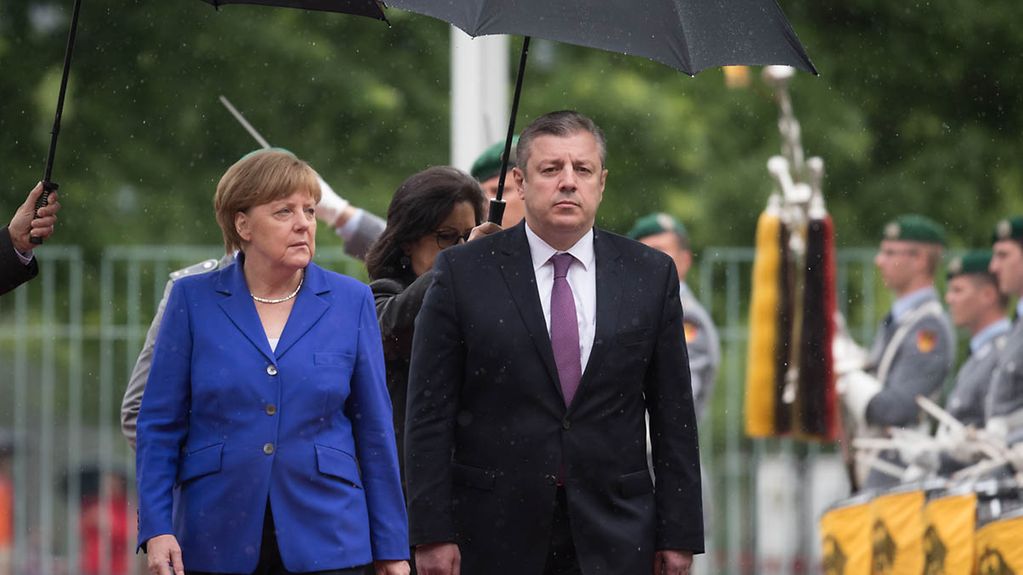Georgian Prime Minister in Berlin
Germany and Georgia intend to further develop economic contacts, announced Chancellor Angela Merkel following talks with Prime Minister Giorgi Kvirikashvili at the Federal Chancellery. She would also like to see the rapid introduction of visa liberalisation for Georgian citizens.
4 min reading time

Inaugural visit to Berlin: Chancellor Angela Merkel welcomes Georgian Prime Minister Giorgi Kvirikashvili
Photo: Bundesregierung/Kugler
During the inaugural visit of Georgian Prime Minister Giorgi Kvirikashvili to Berlin, Chancellor Angela Merkel stressed how intensive relations between the two countries are. "In the 25th year of Georgian independence, the cordial relations between our two countries were reflected in our talks," underscored the Chancellor.
Georgia’s Prime Minister expressed his thanks for Germany’s strong support, and explained, "Relations between Germany and Georgia have taken on a new quality over the last few years in particular."
Stepping up economic relations
Angela Merkel praised the most recent economic reforms and the liberalisation of Georgia’s economy. "This is an excellent basis for stepping up economic contacts with German companies. In the construction sector we already have very close contacts, but we can put our economic relations on a broader footing," said the Chancellor.
In Germany too little attention is still paid to the huge progress that Georgia has made in recent years, she added, especially in terms of achieving international competitiveness and transparency.
Giorgi Kvirikashvili, who opened a German-Georgian business forum before arriving at the Federal Chancellery, reported, "A total of 150 companies and industrialists attended the forum. That is a clear sign that our economic relations are becoming stronger." More than 300 German businesses already have operations in Georgia. "I believe there is still a lot more potential that can be harnessed," he said.
Germany is currently Georgia’s sixth-largest trading partner. In 2015, trade between Germany and Georgia was worth 454 million euros. Georgia mainly imports cars and car parts, machinery, chemical products, electrical goods and food from Germany, while its main exports to Germany are food and textiles.
Cooperation within an international framework
With a view to the Association Agreement with the European Union, the Chancellor confirmed that the agreement has helped increase economic contacts between Georgia and EU member states. It is encouraging to note that, parallel to this, Georgia has adopted a pragmatic attitude in its relations to Russia. She also stressed, however, "We continue to support the territorial integrity of Georgia." This includes the South Ossetia and Abkhazia questions, she said.
For his part, the Georgian Prime Minister pointed to the fact that the German government has consistently supported Georgia’s sovereignty for 25 years. He said, "Germany and Georgia are fighting together for stability in the region. Georgia may be a small country, but we stand proudly beside the European Union and NATO in the fight against terrorism and numerous other operations." He gave his assurances that Georgia would continue to work for democratisation and Europeanisation in the country.
With a view to Georgia’s efforts to join NATO, he thanked the German government for its contribution to what is known as the "Substantial NATO-Georgia Package". The Chancellor also pointed to Georgia’s positive part in the Geneva talks on important humanitarian issues.
Implementing visa liberalisation rapidly
On the question of visa liberalisation, the European Commission has noted that Georgia has met the preconditions, reported Angela Merkel. It is now a question of deciding when visa liberalisation for Georgian citizens will be introduced. "I have pointed out that this matter must be seen in conjunction with the so-called 'snap-back mechanism' which makes it possible to respond more swiftly should serious difficulties arise." This would, for instance, be the case if a large number of citizens of a country enjoying visa-free travel to the EU were to apply for asylum in Germany.
The European Parliament is due to decide on the snap-back mechanism soon. "I am confident that we will be voting in the very near future on visa liberalisation for citizens of Georgia," said Angela Merkel.
The Georgian Prime Minister stressed the importance of visa liberalisation for Georgian-European relations. "Within the scope of the free trade agreement and the Association Agreement with the EU, the question of visa liberalisation is an important milestone for the people of Georgia."
On 23 March 1992, Germany was the first European Community member state to officially recognise Georgia after it declared its independence in 1991. Following the establishment of diplomatic relations in April 1992, Germany was the first country to open an Embassy in Georgia.
Stepping up bilateral cooperation
Within the framework of bilateral relations, the Chancellor announced that 2017 is to be the German-Georgian Friendship Year, and that Georgia will be the Guest of Honour at the Frankfurt Book Fair in 2018. "This will give many people in Germany the chance to become more familiar with Georgian culture and Georgian writers," she said.
Giorgi Kvirikashvili stressed, "We greatly appreciate your support in the field of education." An astonishing number of Georgians come to Germany every year to study and conduct research with the support of various German foundations.
With respect to stepping up cooperation in the field of technical and vocational education and training, he said, "We see Germany as a trailblazer here." That is why, he continued, the ministries of education of two countries will be signing a memorandum this very day that will help Georgia implement reforms. In the afternoon a declaration of intent is to be signed by both countries pertaining to the future dialogue on matters of vocational training.
In Berlin, the Georgian Prime Minister will also meet with Federal Foreign Minister Frank-Walter Steinmeier, as well as attending a special event to mark the 25th anniversary of Georgian independence.